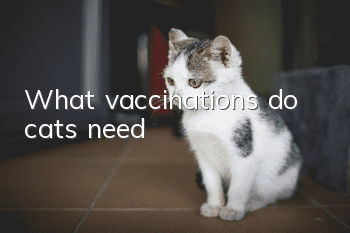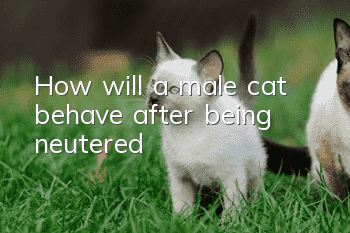What vaccinations do cats need?

After you have prepared the items your cat needs and selected a suitable cat, you are not in a hurry to take the cat home. First, you need to send the cat to the hospital for examination. After a few days, the cat needs to be vaccinated. After that, you can rest assured. The cat was brought home safely. So what vaccinations do cats need?
Feline infectious disease prevention mainly uses feline triple vaccine. Cat triple vaccine is triple vaccine, which can prevent three viral infections, including feline distemper, feline infectious rhinotracheitis and feline calicivirus.
Common triple vaccines for cats include Dutch Intervet, French VIC, American Pfizer and American Ford. Vaccines are divided into attenuated vaccines and inactivated vaccines according to their properties. Attenuated vaccines are also called live attenuated vaccines. This type of vaccine has a better immune effect and requires fewer vaccinations. However, it may be infected with bacteria and has strict storage requirements. Dutch Intervene is a attenuated vaccine. Inactivated vaccines are safer, but the immune effect is short-lasting, requires repeated vaccination, and has a mediocre immune effect. The Fordow vaccine in the United States is an inactivated vaccine. In general, attenuated vaccines are better than inactivated vaccines, but in terms of safety, inactivated vaccines are better, especially for kittens and sick and weak cats, inactivated vaccines should be chosen when vaccinating. Parents can choose which vaccine to vaccinate based on their baby’s physical condition, but we recommend that healthy cats should choose attenuated vaccines.
Things that should be paid attention to when injecting cat triplex:
1. A cat with a completely healthy physical examination, no upper respiratory tract infection, no diarrhea, and a normal body temperature and in a good mental state
2. Pregnant cats are prohibited from using attenuated vaccines (to avoid causing miscarriage)
3. Use with caution in nursing cats
4. Use with caution on weak cats (including newly purchased cats and newly adopted stray cats, after two weeks of isolation and observation)
5. Cats that have been in contact with cats suffering from infectious diseases but have not become ill should avoid vaccination within two weeks and should be observed in isolation. Cats that have been in contact with cats suffering from feline distemper but have not been vaccinated need to be urgently injected with serum (two doses of serum should be injected). Vaccination is allowed after 2 weeks)
6. If a cat develops an allergic reaction (facial edema, shortness of breath, itching, etc.) after being vaccinated, it should be desensitized in time to avoid contact with sick cats with infectious diseases during the vaccination period (generally immunity will develop seven days after vaccination) )
Cat triple immunization program:
1. The first basic vaccination for kittens is between nine and twelve weeks old. The second vaccination should be three to four weeks apart from the first vaccination, and then once a year.
2. If adult cats have not been vaccinated before, they need to be vaccinated twice. If they have been vaccinated before, they only need to be vaccinated once a year.
3.About the immunization program for stray cats: In epidemic areas where infectious diseases are prevalent and in winter and spring, attention must be paid to the isolation and observation of stray cats (immune globulin or serum can be injected if conditions permit). Two weeks later, the vaccine can only be injected after confirming that the body is healthy, and the group can be mixed after seven days.
4. Try to avoid sterilization surgery and vaccination at the same time. It is best to vaccinate two weeks before the surgery. If there is no time to vaccinate, you can inject serum or immune globulin during the surgery.
- What to do if a kitten vomits and foams
- Why are blue cat ears folded?
- How do novices choose Ragdoll cats? Things to note when choosing Ragdoll cats!
- Destructive resorptive damage to cats’ teeth - tooth resorption
- Can cats also suffer from migraines?
- How will a kitten react when frightened?
- What are the benefits of probiotics for cats? Can cats take probiotics for a long time?
- How to avoid bad eating habits in cats?
- What foods should older cats eat?
- Symptoms of a parasite in a cat’s belly Symptoms of a parasite in a cat’s belly



